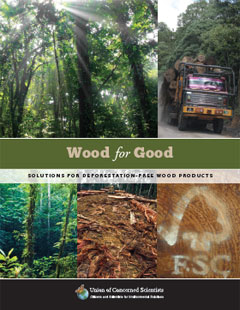Wood from tropical forests is used to create products in our everyday lives, including furniture, paper, and kitchen cabinets. But while wood is a renewable resource, many logging activities in the tropics are done without regard to the forest ecosystem. Over time this can limit the forests' ability to regrow, leading to reduced biodiversity and increased global warming pollution.
Logging activity can also pave the way for increased deforestation as logging trucks create in-roads that allow access for agricultural development, especially the production of vegetable oils and beef, two primary drivers of tropical deforestation.
Wood can be sustainably produced, however, if it comes from well-managed forest, including plantations grown on previously cleared land. Certification programs such as the Forest Stewardship Council (FSC) can help consumers and businesses identify wood grown in a sustainable manner—and offer the best available option to protect our world's forests for generations to come.
Wood for Good: Solutions for Deforestation-Free Wood Products looks at how smart choices by consumers, businesses, and policy makers can help reduce the impacts of wood production on deforestation and reviews the economics and environmental impacts of the global wood industry.




